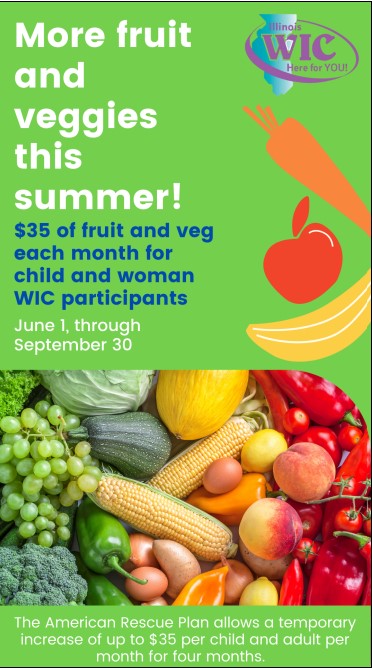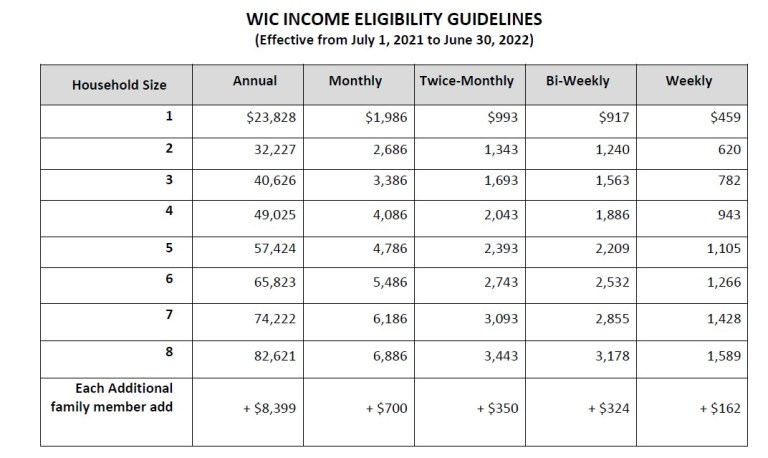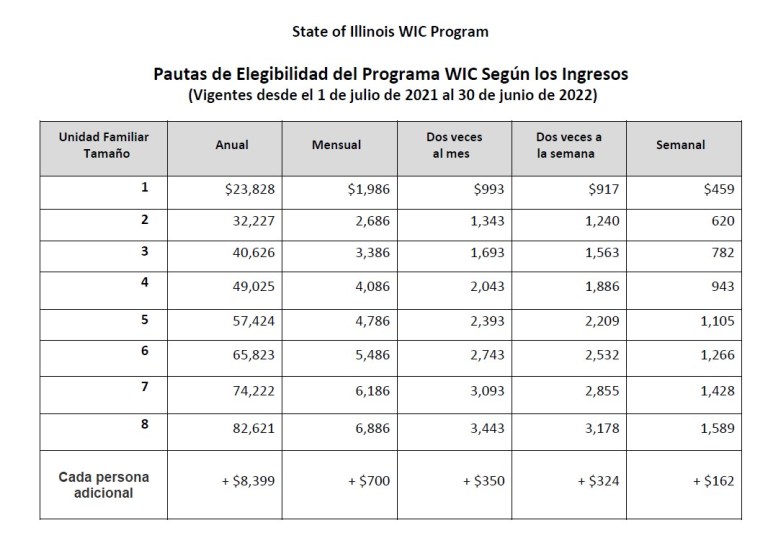W.I.C.

Special Supplemental Nutrition Program for Women, Infants and Children
The Special Supplemental Nutrition Program for Women, Infants and Children (WIC) is a federal health, nutrition, and prevention program with a successful record of improving the diet and safeguarding the health of infants and children under age five and pregnant, postpartum, and breastfeeding women who are at risk for nutrition-related illness. WIC is administered by the Illinois Department of Human Services (IDHS) and is funded by the United States Department of Agriculture (USDA). These benefits are available in all 102 Illinois counties at more than 220 clinics, which include county health departments, community action agencies, and hospitals.
In Illinois, approximately 40 percent of all babies born are on the WIC program. Studies show the tremendous impact the WIC program has had on improving the health status of at-risk, low-income pregnant, postpartum, and breastfeeding women, infants and young children. WIC is the entry point or “gateway” program for this population into the health care system. Recent studies have shown that WIC reduces fetal deaths, infant mortality, low birth weight rates, and iron deficiency anemia in children and increases immunization rates.
WIC provides nutrition education, counseling and support, breastfeeding support, nutritious foods, health screenings, and referral to other services. WIC enables parents to feed their children properly during critical periods of growth and development. The combination of nutrition education, nutritious foods, and access to other health services strengthens families long after their WIC eligibility has ended.
CIVIL RIGHTS: The WIC Program is an equal opportunity program open to all eligible persons regardless of race, color, sex, national origin, age, or disability. If you believe you have been discriminated against you may write to USDA, Director, Office of Civil Rights, 1400 Independence Avenue, SW, Washington, D.C. 20250-9410 or call (800) 795-3272 or (202) 720-6382 (TTY).”
Who WIC Helps
- Pregnant Women
- Moms up to 6 months after the baby is born, if they are not breastfeeding
- Moms up to 1 year after the baby is born, if they continue breatfeeding
- Babies up to their 1st birthday
- Children from age 1 up to their 5th birthday
What WIC Provides
- Nutritious Foods
- Nutrition Information
- Healthcare Referrals
- Community Program Information
Partner with WIC staff to meet your goals such as….
- Healthy Eating
- Breastfeeding
- Physical Activity
- Dental Care
- Food Safety
- Shopping on a budget
- Healthy Cooking
- Regular Healthcare and Vaccines
- Healthy Weight Gain
WIC Encourages Breastfeeding
 Breastfeeding is a special time for everyone. The entire family can be part of the new baby’s life. Breast milk is the best food for your baby’s health. It has just the right balance of vitamins, minerals, and other nutrients needed for your baby to grow well. Breastfeeding helps to establish a secure and loving bond between you and your baby and offers you many positive health benefits as well, including a reduced risk of diseases such as breast cancer and diabetes.
Breastfeeding is a special time for everyone. The entire family can be part of the new baby’s life. Breast milk is the best food for your baby’s health. It has just the right balance of vitamins, minerals, and other nutrients needed for your baby to grow well. Breastfeeding helps to establish a secure and loving bond between you and your baby and offers you many positive health benefits as well, including a reduced risk of diseases such as breast cancer and diabetes.
While breastfeeding is natural, it is also natural to feel a little unsure of yourself at first. If you have questions or need help, call your local WIC staff at (618) 662-4406. They can help you meet other breastfeeding mothers (peer counselors) and breastfeeding experts you can talk to.
When a woman delivers her infant and begins to breastfeed, WIC offers support and guidance through the help of trained breastfeeding peer counselors. These are women who have breastfed and completed a training course to equip them to offer support to other women who are breastfeeding.
Breast-feeding mothers can remain on the WIC program for one year after the birth of their infant. They also receive a larger food package when they are breastfeeding.
Breast-feeding mothers are encouraged to call the WIC office anytime with questions regarding breastfeeding.
This institution is an equal opportunity provider.
Esta institucion es un proveedor que ofrece igualdad de oportunidades.

Become Healthier
Good nutrition helps protect against some health problems like obesity. Becoming healthier isn’t just about eating healthy – it’s also about physical activity. What you eat and drink and your level of physical activity. what you eat and drink and your level of physical activity are important for your own health, and also for your child’s health. Your children watch what you do more thatn they listen to what you say. For example don’t just tell your child to eat thier vegetables – show them that you eat and enjoy vegetable every day.
Active parents tend to raise active children. Make active play fun for the whole family. Let your child help plan the fun. Start by doing what you can, at least 10 minutes at a time. Every bit adds up. Include 2 1/2 hours of physical activity each week – children need at least 60 minutes each day.
Parents are encouraged to call the WIC staff with questions regarding childhood nutrition at (618)662-4406.
This institution is an equal opportunity provider.
Esta institucion es un proveedor que ofrece igualdad de oportunidades.
WIC INFANT SERVICES
Mothers can enroll their infants in WIC shortly after their birth. An appointment is scheduled within several days when the mother calls in the infant’s birth information. When the infant comes to the WIC office, a nurse and nutritionist will both assess the infant, answering questions the mothers have regarding infant care and feeding. At this initial visit, breast feeding mothers are issued the larger food package. They are encouraged to attend the breast feeding support group luncheon and take advantage of WIC to answer all their breast feeding questions. Mothers who choose to feed their infants artificial baby milk will receive food instruments for the infants that provide a supply of artificial baby milk. However, WIC is a supplemental food program and does not supply all the artificial baby milk the infant will need during it’s first year of life. Infants who are breast fed and those who are fed artificial baby milk receive food instruments for infant cereal and juice in the later portion of the first year of life.
At 2, 4 and 9 months, infants are scheduled for nutrition education sessions. During these group or individual sessions, infant feeding practices are discussed. Breast fed infants attend a combined nutrition session designed for both mother and baby. This session is meant to be a support group for those mothers who are breast feeding. Infants who are fed artificial baby milk are scheduled to attend nutrition sessions led by an employee of Baby TALK. They receive parenting information along with nutrition information. It is not necessary for the parent to bring the infant to these sessions.
At 6 months, infants are scheduled for a follow-up session in which they are assessed by both the nurse and the nutritionist.
The WIC staff serves as a source of nutrition education for the community. Parents of newborn infants are encouraged to call the WIC office anytime during working hours to receive infant nutritional information.
If a parent is in need of medical or social services, the WIC staff can help to link that parent with the correct agency or organization in the community.
This institution is an equal opportunity provider.
Esta institucion es un proveedor que ofrece igualdad de oportunidades.
WIC Services for Pregnant, Breastfeeding or Post-Partum Women
 Women who are eligible for WIC services are certified according to their category (see How WIC Works). At certification appointments, a woman’s health is assessed by the nurse. She will be weighed, measured, and have her hemoglobin tested. The nutritional status will be assessed by the WIC nutritionist. She will be asked to complete a 24-hour diet recall and a food frequency list. The nutritionist will then suggest ways in which the woman might improve her nutritional status.
Women who are eligible for WIC services are certified according to their category (see How WIC Works). At certification appointments, a woman’s health is assessed by the nurse. She will be weighed, measured, and have her hemoglobin tested. The nutritional status will be assessed by the WIC nutritionist. She will be asked to complete a 24-hour diet recall and a food frequency list. The nutritionist will then suggest ways in which the woman might improve her nutritional status.
The food package which the woman receives includes eggs, peanut butter or dried beans or peas, milk, cheese, fruit juice, and iron-fortified cereal. These nutritious foods are provided by the WIC program in an effort to improve the birthing outcomes for women.
This institution is an equal opportunity provider.
Esta institucion es un proveedor que ofrece igualdad de oportunidades.

n accordance with Federal civil rights law and U.S. Department of Agriculture (USDA) civil rights regulations and policies, the USDA, its Agencies, offices, and employees, and institutions participating in or administering USDA programs are prohibited from discriminating based on race, color, national origin, sex, disability, age, or reprisal or retaliation for prior civil rights activity in any program or activity conducted or funded by USDA.
Persons with disabilities who require alternative means of communication for program information (e.g. Braille, large print, audiotape, American Sign Language, etc.), should contact the Agency (State or local) where they applied for benefits. Individuals who are deaf, hard of hearing or have speech disabilities may contact USDA through the Federal Relay Service at (800) 877-8339. Additionally, program information may be made available in languages other than English.
To file a program complaint of discrimination, complete the USDA Program Discrimination Complaint Form, (AD-3027) found online at: http://www.ascr.usda.gov/complaint_filing_cust.html , and at any USDA office, or write a letter addressed to USDA and provide in the letter all of the information requested in the form. To request a copy of the complaint form, call (866) 632-9992. Submit your completed form or letter to USDA by:
mail: U.S. Department of Agriculture, Office of the Assistant Secretary for Civil Rights 1400 Independence Avenue, SW Washington, D.C. 20250-9410;(2) fax: (202) 690-7442; or
(3) email: program.intake@usda.gov.
This institution is an equal opportunity provider.

De conformidad con la Ley Federal de Derechos Civiles y los reglamentos y políticas de derechos civiles del Departamento de Agricultura de los EE. UU. (USDA, por sus siglas en inglés), se prohíbe que el USDA, sus agencias, oficinas, empleados e instituciones que participan o administran programas del USDA discriminen sobre la base de raza, color, nacionalidad, sexo, discapacidad, edad, o en represalia o venganza por actividades
previas de derechos civiles en algún programa o actividad realizados o financiados por el USDA.
Las personas con discapacidades que necesiten medios alternativos para la comunicación de la información del programa (por ejemplo, sistema Braille, letras grandes, cintas de audio, lenguaje de señas americano, etc.), deben ponerse en contacto con la agencia (estatal o local) en la que solicitaron los beneficios. Las personas sordas, con dificultades de audición o discapacidades del habla pueden comunicarse con el USDA por medio del Federal Relay Service [Servicio Federal de Retransmisión] al (800) 877-8339. Además, la información del programa se puede proporcionar en otros idiomas.
Para presentar una denuncia de discriminación, complete el Formulario de Denuncia de Discriminación del Programa del USDA, (AD-3027) que está disponible en línea en: http://www.ascr.usda.gov/complaint_filing_cust.html y en cualquier oficina del USDA, o bien escriba una carta dirigida al USDA e incluya en la carta toda la información solicitada en el formulario. Para solicitar una copia del formulario de denuncia, llame al (866) 632- 9992. Haga llegar su formulario lleno o carta al USDA por:
correo: U.S. Department of Agriculture Office of the Assistant Secretary for Civil Rights 1400 Independence Avenue, SW Washington, D.C. 20250-9410;(2) fax: 202) 690-7442;
(3) correo electrónico: program.intake@usda.gov.
Esta institución es un proveedor que ofrece igualdad de oportunidades.
